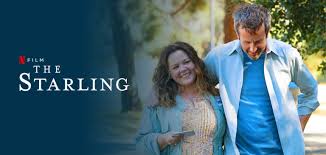DIRECTOR:
Theodore Melfi
RELEASE DATE:
September 24, 2021
TRAILER:
CAST:
Dan Bakkedahl, Laura Harrier, Kevin Kline, Melissa McCarthy, Timothy Olyphant, Rosalind Chao, Daveed Diggs, Dan Bakkedahl, Chris O’Dowd, Skyler Gisondo, Kimberly Quinn.
PLOT:
A belligerent Starling builds a nest next to Lilly’s peaceful house when she suffers a setback. The sassy parrot mocks and then assaults Lilly, who is grieving. She rediscovers her desire for life and capacity for love on her quest to evict the Starling.

REVIEW:
“The Starling” by Theodore Melfi spends so much time and effort attempting to touch your heart, it neglects to keep its own rhythm going. Despite its flaws, it’s a forgettable piece of work, one that relies so heavily on clichés about sorrow that it almost plays like Oscar bait in a film about the movie business. It’s easy to dismiss “The Starling” as manipulative melodrama, but what’s more upsetting is the sheer number of brilliant actors and actresses who were drawn into its downward spiral. What a disappointment to see performers like Melissa McCarthy or Kevin Kline in parts that go against their natural tendencies to create nuanced characters and go against what they are best at doing. In a way, it’s even sadder than the events in the film.

You may shed a tear. It’s a fact. When a drama revolves around individuals who have experienced the unfathomable sorrow of losing a child, it’s challenging to remain objective. Even though I’m a mother of three, I have no idea how I’d cope if it was just no children and me. Yet, for parents who lose a child, the world continues to turn. In the end, Jack (Chris O’Dowd) finds himself in a mental facility because he can’t figure out why it hasn’t stopped. Jack’s wife Lilly (Melissa McCarthy) attempts to keep it together for her husband’s return from the institution when the script’s opening scene is set. Besides working at a grocery store, she’s also trying to look after her family’s property, which leads to a few confrontations with an exuberant bird, hence the title. Every week she drives two hours to visit her husband and is beginning to worry whether he genuinely wants to return home and what life will be like when he does.
It is easy to see Lilly in the position of someone who puts the sorrow of others before managing her own, so a counselor at Jack’s clinic recommends that she first take care of her own mental health before her spouse returns to her day-to-to-day life. The bird subplot will benefit from his new work. Still, he’s also Lilly’s unusual adviser since he can talk to her without the same barriers that his previous occupation erected between them.
When McCarthy and Kline are on screen together, it’s interesting to see how the two actors alternate between pushing and pulling the boundaries of what they’re capable of doing and what the screenplay allows them to do. Kline makes a few allusions to his character’s past, which lends some complexity, but he quickly reverts to tired clichés. In part because of Kline’s remarkable humanity on screen, everything he says to Lilly sounds kind and thoughtful, but it’s also simple and meant to arouse the audience’s emotions. You can watch the brilliant ensemble struggle against the film’s relentless use of its characters in ways that don’t seem real and fail.
There are issues in this tale that aren’t adequately addressed in melodrama, such as how two people remain together when their shared sorrow isn’t identical, which adds to the aggravation. Because we all mourn in our unique ways, tragic events like the death of a child frequently lead to broken relationships. The fact that Jack and Lilly are grieving in such different ways after the loss of their kid provides fodder for nuanced, character-driven criticism. However, this never occurs because everyone is too preoccupied with pressing buttons.
That Melfi directs “The Starling” with the elegance of a Hallmark Greeting Card business investment presentation doesn’t help. A lack of visual interest contributes to the impression that the primary artistic goal was to make people weep. Films may elicit strong emotions in most of us, but they have to be earned via compelling characters, a rich story, and realistic settings. When tears aren’t made by honesty, it’s evident to us. We can sense it. You can see that “The Starling” is weighted down by its desire to see your tears fly away.